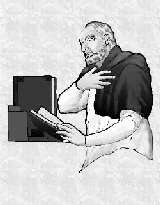
Born: November 13, 354, in Tagaste Numidia (now Souk-Ahars), Algeria
Died: August 28, 430, in Hippo, Regius (now Bône), Algeria
Not since St. Paul has there been one single figure who influenced Christianity as substantially as St. Augustine. His theological writings and tenants shaped the thinking of John Calvin and Martin Luther more than a thousand years after his death. He was a strong advocate of predestination, believing that man was helpless without God's grace. Born in North Africa, he lived in a period of great religious, political, and social disruption. His writings were considered a light in a dark moral epoch.
His mother, Monica, was a devoted Christian. However, Augustine was not baptized as an infant, probably because his father was a pagan. Augustine's father died in 371 when Augustine was in his teens. As a student, Augustine was trained as a rhetorician at schools in Carthage, Tagast and Madaura. While in school, he read an essay written by Cicero, which pointed him toward philosophy and began his search for spiritual truth.
Much of what is known about Augustine is contained within his work. Confessions, written from 397 to 401, is an autobiographical recollection of his life and philosophy before he became the bishop of Hippo in 396. The first doctrine Augustine adopted was Machichaeism, a philosophy stressing the struggle of good/evil and light/dark. The moral code of Machichaeism was not very strict, which probably suited Augustine. During his youth, he participated in the accepted practice of keeping concubines. With one of these women, Augustine had a son in 372. His son was named Adeodatus, which is Latin for "the gift of God".
At the age of 28, Augustine traveled with his mother and son to Rome to teach rhetoric. In 384, he moved to Milan, this time teaching Machichaeism. In Milan, he met bishop Ambrose who interested him in the works of Plato. During his stay, he was visited by a child-like voice which compelled him to read part of the bible. The mystic phenomena so affected him that he was converted to Christianity in 386. A year later, he was baptized, along with his son, by Ambrose. His mother rejoiced in the transformation, but died at Ostia on their return to Africa. Later, she was canonized by the Roman Catholic Church for the influence she had on her son.
Returning to Africa, Augustine lived a spiritual, monastic life for several years before being urged by the people of Hippo to be ordained. In 396 he became a bishop and was known as a spiritual and moral leader in that city.
During the next 36 years, he rarely left the city. More than 250 of his letters of admonishment and encouragement to other congregations still exist. His work The City of God, written from 413 to 426, significantly influenced Christian doctrine. In it, he postulates the philosophy of history, attacks faults within certain types of religious thinking, and charts the origins of the church.
Augustine was killed by the Vandals when they besieged the city of Hippo in 430. His feast day is August 28. The Roman Catholic religious order of Augustinians bear his name.